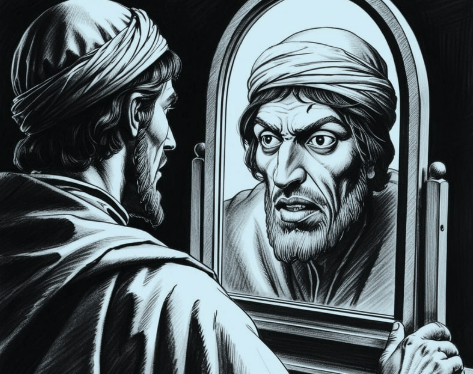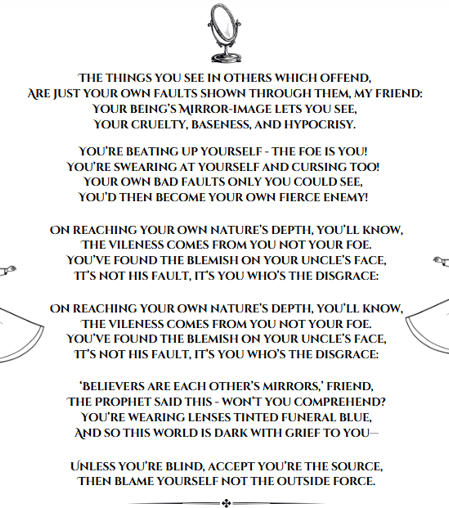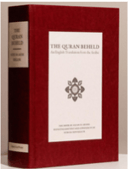Enemy in the Mirror
A Lesson in Self-Reflection from Rumi
Ali Ishtiaq
3/16/20256 min read


So there I was, reading Jawid Mojaddedi’s translation of Rumi’s Masnawi—a masterpiece, by the way, and the only poetic translation out there – when suddenly, this poem hit me like a philosophical brick. You know that moment when you’re reading something, and it feels like the universe is holding up a sign just for you? Yeah, it was one of those. It’s a humbling experience, really, to read Rumi. You start off nodding along, thinking, Wow, this is deep, this is profound, and then suddenly, you realize—Wait. He’s talking about me. There’s no escaping it. The man saw right through human nature, and 800 years later, he’s still calling us out on our nonsense. (Pause for a moment and send a FATIHA for Rumi as a token of gratitude)
At first, I wanted to resist. Surely, I’m not that bad. I mean, sure, I get annoyed at people sometimes, but that doesn’t mean I’m guilty of their flaws, right? Wrong. Rumi, like a wise and slightly smug friend, reminds us that the things we judge in others are often things we don’t want to admit about ourselves. And the sooner we accept this, the sooner we can actually start growing.
And then came the poem that left no room for excuses:
Ouch. That one stings, doesn’t it?
You know that moment when someone annoys you to your very core, and you think, How can they be so insufferable?—Rumi is here to tell you, It’s you, buddy. The things we find unbearable in others? They’re reflections of our own flaws. That rude, arrogant coworker? Maybe it’s our own ego we’re reacting to. The hypocrisy in politicians? Maybe we’ve been bending truths ourselves. The selfishness in a friend? Maybe we’ve been just as self-centered in a different way.
The hardest thing to accept is that we are not innocent spectators in this life; we are both the judge and the accused, the critic and the subject. It’s a bitter pill to swallow, but also a liberating one. Because if the problem lies within, so does the solution.
The Mirror Theory
Rumi’s words aren’t just poetry; they are a deep psychological truth wrapped in verse. What he describes is what modern psychologists call projection—the idea that we subconsciously attribute our own flaws to others because we don’t want to acknowledge them in ourselves.
Carl Jung referred to this as the ‘shadow self’, the unfiltered, unflattering parts of ourselves that we suppress. But here’s the catch—just because we shove them into our subconscious doesn’t mean they disappear. Instead, they find a sneaky way to resurface: by showing up in other people.
Rumi’s words are eerily similar to what modern self-help books tell us about projection.
• In The Mountain Is You, Brianna Wiest writes about how we sabotage ourselves by externalizing our problems rather than confronting them.
• In Ego is the Enemy, Ryan Holiday argues how our egos distort reality. They convince us that the world is against us, when, in fact, we’re often the ones sabotaging ourselves. Instead of blaming external circumstances, he suggests we look inward, take responsibility, and strip away the illusions that prevent us from growing.
However, it turns out, Allah Most High in the Quran and Prophet Muhammad (peace be upon him) had already spelled it out 15 centuries ago:
“In their hearts is an utter sickness; so Allah has increased them in sickness;” (Quran 2:10)
“Rather shall Man beheld himself all too clearly, though he cast forth a great many of his most ardent excuses.” (Quran 75:13-14) – Translation from Quran Beheld
(Translation taken from Quran Beheld by Sheikh Nuh Ha Mim Keller)
“Believers are each other’s mirrors.” (Hadith)
If we don’t like what we see in others, maybe it’s time for a little personal housecleaning.
Final Thoughts
Rumi’s poem is an invitation to self-awareness, but let’s be real—it’s not an easy one to accept. It’s far more comforting to believe that the world is the problem. That society is broken, that people are cruel, that life is unfair. It gives us a sense of righteousness, an excuse to stay exactly as we are.
But here’s the uncomfortable truth: if everyone around us seems unbearable, maybe the problem isn’t "them." Maybe it’s us.
This realization stings because it forces us to take responsibility. It means that the anger, frustration, and disappointment we feel might not be caused by the outside world but by our own unresolved issues. It means that when we complain about selfishness, dishonesty, or arrogance in others, we might just be seeing reflections of our own flaws.
And that is both terrifying and liberating.
Because if the enemy is within, so is the power to change. If the root of our struggles lies in our own mindset, actions, and reactions, then we are no longer helpless victims of the world. We are in control.
So, what does that mean in practice?
• Flip the Script – Instead of blaming others for their flaws, turn inward and ask if you exhibit the same behavior in a different way.
• Catch Yourself in the Act – The moment you judge or criticize someone, pause and ask, Do I do this too?
• Change Your Lenses – Shift your perspective to see situations and people with understanding rather than judgment.
Self-awareness is uncomfortable, but it’s the only way forward. The world isn’t out to get us—it’s just mirroring back what we refuse to see in ourselves.
Now, go stare into that metaphorical mirror—if you dare.
Read Mojaddedi’s (5 Vol.) Translation
Buy from Amazon:
Seriously, if you’re going to read Masnawi, do yourself a favor and get Jawid Mojaddedi’s version. Unlike other translations that strip Rumi of his lyrical brilliance and leave us with dry, prose-like interpretations, Mojaddedi actually keeps the poetry alive. Just look at the rhythm, the flow, the punch of that poem! It’s the kind of thing you read and immediately start questioning all your life choices..
It’s also way more readable than those old-school academic translations that sound like they were written for a 13th-century scribe. Mojaddedi’s work makes Rumi’s insights accessible without dumbing them down. If you haven’t read Masnawi yet, this is the translation you want. Trust me on this one.
If you’re in Lahore, here’s an even better deal: instead of spending Rs. 25,000+ on the full five-volume translation, you can borrow it through Bookflix, Lahore’s first online book lending service. Our subscription plans are affordable compared to buying books, and you can test out this masterpiece before committing to it. Why buy one expensive book when you can access a library of them?
Recommended Reads for Deep Reflection
(click the titles to BUY from Amazon)
Islamic Books
Purification of the Heart – Sheikh Hamza Yusuf
The Book of Assistance – Imam Al-Haddad
Agenda to Change Our Condition – Imam Zaid Shakir & Shaykh Hamza Yusuf
Al-Ghazali on the Condemnation of Pride and Self-admiration
Al-Ghazali on Vigilance & Self-Examination
Self-Help Books
Ego is the Enemy – Ryan Holiday
The Mountain Is You – Brianna Wiest
Want to put Rumi’s wisdom into action? Try journaling!
Self-Care: A Day and Night Reflection Journal (90 Days)
Support Me: I put a lot of effort into creating insightful blog posts and curating content that inspires a love for reading. If my work adds value to your day, buy me a coffee and be part of this journey! Every cup fuels a new chapter.
Affiliate Disclosure: This article contains affiliate links, which means I may earn a small commission if you purchase through them—at no extra cost to you. This helps support my work in bringing valuable insights and book recommendations to readers like you. Thank you for your support!
Disclosure: The author of this explanation (Ali Ishtiaq) does not claim to be an authority on Rumi. He is merely sharing his surface-level interpretation of the great poet’s words. For a deeper understanding, one should turn to experts in the field.






